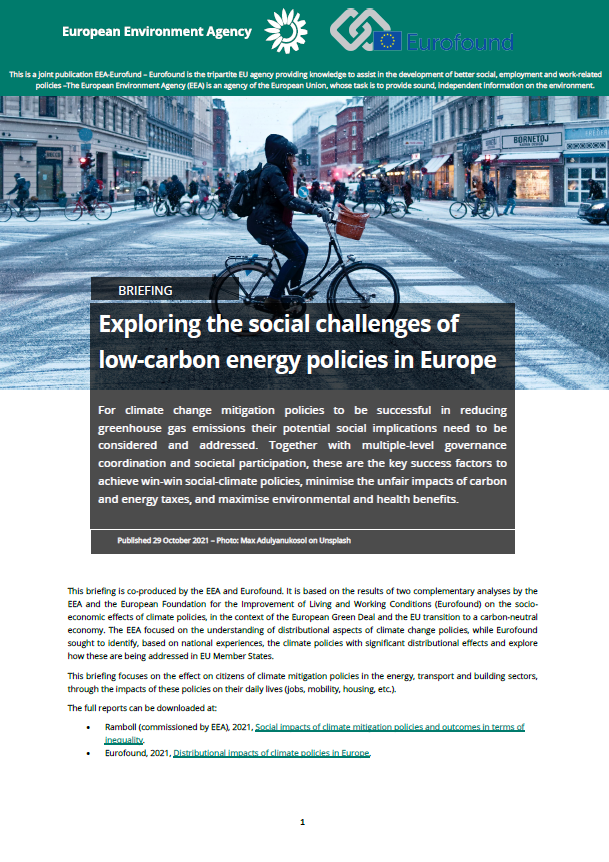
This briefing is co-produced by the European Environment Agency (EEA) and Eurofound. It is based on the results of two complementary analyses by the EEA and the European Foundation for the Improvement of Living and Working Conditions (Eurofound) on the socioeconomic effects of climate policies, in the context of the European Green Deal and the EU transition to a carbon-neutral economy. The EEA focused on the understanding of distributional aspects of climate change policies, while Eurofound sought to identify, based on national experiences, the climate policies with significant distributional effects and explore how these are being addressed in EU Member States. This briefing focuses on the effect on citizens of climate mitigation policies in the energy, transport and building sectors, through the impacts of these policies on their daily lives (jobs, mobility, housing, etc.).
Key findings
To achieve its objective of becoming climate neutral by 2050, the EU relies on a portfolio of policy instruments such as regulation, economic and financial incentives, education, training and R&D. Some of these measures make low-carbon options and energy efficiency improvements more economically attractive by increasing the price of fossil fuels.
Such measures have direct effects on people’s quality of life, from economic and environmental perspectives. The magnitude of these effects depends on the socio-demographic context, such as income level, location, employment situation or age.
In addition to reducing greenhouse gas emissions, climate change mitigation policies may generate positive environmental co-benefits, such as improved air quality, with positive outcomes in terms of health and well-being. Lower income households and vulnerable groups tend to benefit more from these effects, helping to reduce environmental inequalities.
Measures leading to increased energy prices (e.g. carbon and energy taxes) tend to disproportionately affect the finances of lower-income households. This can jeopardise the acceptability and effectiveness of such climate policies.
Ensuring a fair transition towards climate neutrality may rely on pursuing three complementary objectives: (1) aiming for win-win social-climate mitigation policies that reduce both social inequality and greenhouse gas emissions (e.g. improving energy efficiency in buildings or investing in sustainable public transport and active mobility); (2) minimising the monetary inequalities resulting from the transition to carbon-neutral economies (e.g. recycling carbon tax revenues to compensate negatively affected groups); and (3) maximising non-monetary co-benefits, such as health co-benefits.
- Number of pages
-
16
- Reference nº
-
EF22004
- ISBN
-
978-92-9480-400-6
- Catalogue nº
-
TH-AM-21-011-EN-N
- DOI
-
10.2800/86682
- Permalink
Cite this publication
Eurofound and the European Environment Agency (2021), Exploring the social challenges of low-carbon energy policies in Europe, Publications Office of the European Union, Luxembourg